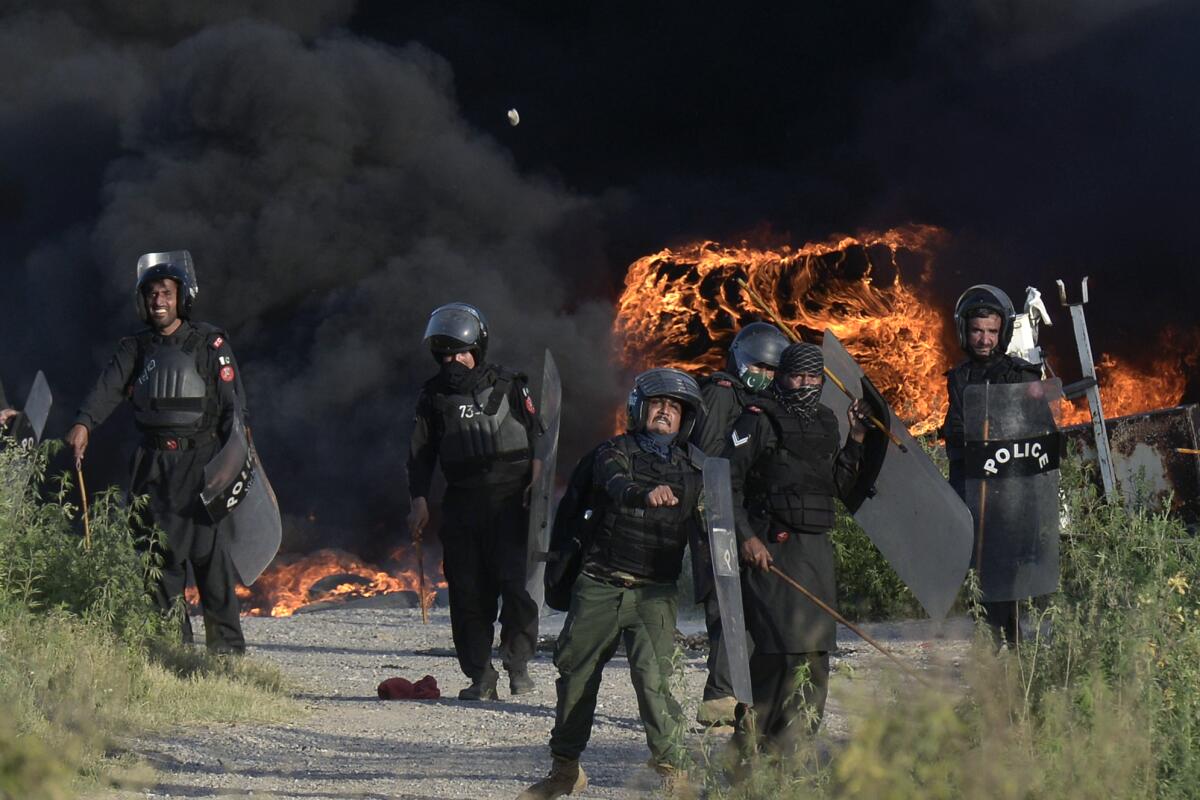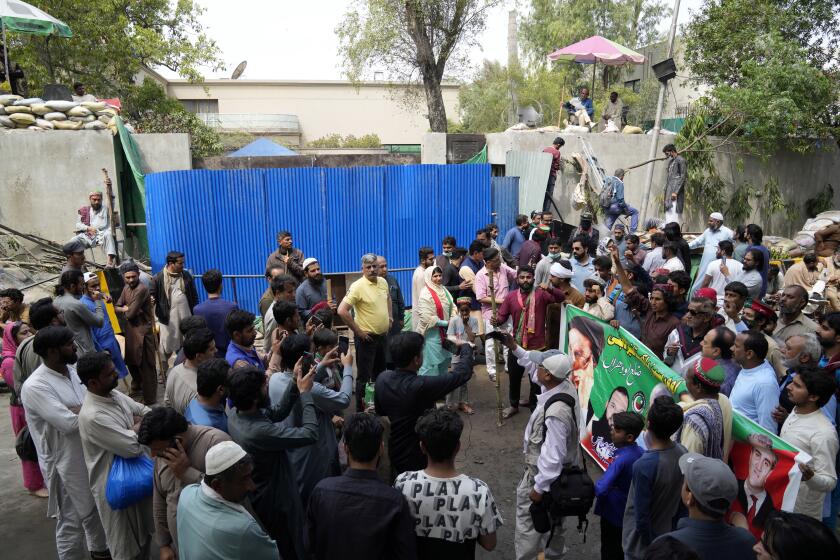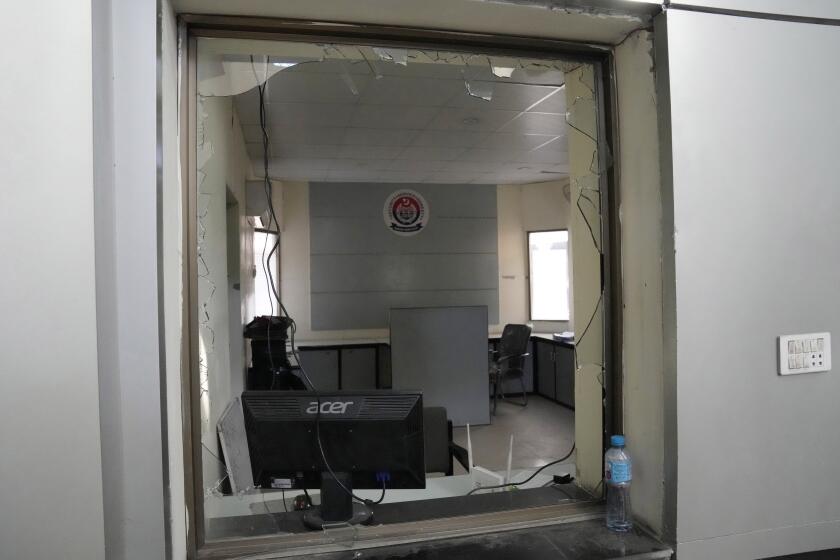Pakistan’s high court orders release of arrested former leader Imran Khan

- Share via
ISLAMABAD, Pakistan — Pakistan’s Supreme Court on Thursday ordered the release of former Prime Minister Imran Khan, whose arrest earlier this week sparked a wave of violence across the country by his supporters.
Khan’s backers danced in the streets outside the court building, celebrating the latest turn in the confrontation between the ex-premier and the current government. Amid days of clashes between protesters and police, and mob attacks on military and government sites, the government had cracked down on Khan’s supporters, arresting more than 2,000 in raids around the country.
As the Supreme Court ruled Khan’s arrest Tuesday was illegal, Chief Justice Umar Ata Bandial urged Khan to appeal to his supporters to remain peaceful. The government had warned that freeing him would reward and encourage violence.
Though Khan was released from custody, he will be under protection of security forces in a safe location in the capital, Islamabad, the head of his legal team, Babar Awan, told reporters. He is to appear before the Islamabad High Court on Friday, Awan said.
Even for a nation accustomed to military takeovers, political crises and violence, the turmoil has been unusual. It echoed unrest that followed the 2007 assassination of former Prime Minister Benazir Bhutto during an election rally in the garrison city of Rawalpindi. Her supporters at the time, outraged by her killing, rampaged for days across Pakistan.
Khan, who was removed from office a year ago by a no-confidence vote in parliament, faces multiple corruption charges in Pakistani courts. But his arrest was a startling, dramatic move: He was in court Tuesday for one set of charges when anti-graft agents barged in, dragged him away and shoved him into an armored vehicle in connection with another set of charges.
Police have filed charges against ex-Prime Minister Imran Khan, 17 of his aides and scores of supporters, accusing them of terrorism and other offenses.
In the violence that ensued, at least 10 of his supporters were killed and dozens were injured, along with more than 200 police officers hurt. Protesters torched trucks, cars and police vehicles in the streets and blocked highways. A mob set fire Tuesday to the sprawling residence of a top army commander in Lahore, Pakistan’s second-largest city. Demonstrators burned down a railway station on the outskirts of the capital, Islamabad, on Wednesday night.
On Thursday, police filed new terrorism charges against Khan and top leaders of his Pakistan Tehreek-e-Insaf party for allegedly inciting mobs to violence.
In an address to the nation late Wednesday, Prime Minister Shahbaz Sharif — who took over after Khan was removed in April last year in a no-confidence vote in parliament — said the unrest by the former premier’s followers had “damaged sensitive public and private property,” forcing him to deploy the military in Islamabad, in Punjab — Pakistan’s most populous province — and in volatile regions of the northwest.
Following the violence, the government shut down schools, colleges and universities in Punjab and northwestern Khyber Pakhtunkhwa provinces, where Khan has a massive grassroots following and where most of the violence was reported. At least seven of the protester deaths so far have been reported in Khyber Pakhtunkhwa and two in Punjab’s capital, Lahore, along with one in the southwestern city of Quetta. The government also suspended internet service in various parts of the country.
Pakistani police arrest at least 50 suspects in the mob lynching of a man who was in custody on suspicion of committing blasphemy against Islam.
“We will arrest all those who disrupted law and order,” said Mohson Naqvi, the chief minister in Punjab.
Officials say Khan’s supporters in particular targeted military installations because he has been blaming the military for his 2022 ouster, while also claiming that it was a conspiracy by Washington and Sharif’s government — allegations that both the U.S. and Sharif have denied. The military has also said it played no role in Khan’s ouster.
Amid the violence, Khan’s supporters have attacked the military headquarters in Rawalpindi and security posts in the northwest, torching the Chakdara security fort on the border with Afghanistan. In Lahore on Tuesday night, demonstrators ransacked and burned down the residence of the regional commander, Lt. Gen. Salman Fayyaz Ghani.
The military vowed Wednesday to respond to attacks by demonstrators with full force. It said the attacks on its installations were launched in an orchestrated manner, and called the violence a “black chapter” in the country’s history.
The military has directly ruled Pakistan for more than half of the 75 years since the country gained independence from British colonial rule and wields considerable power over civilian governments.
More to Read
Sign up for Essential California
The most important California stories and recommendations in your inbox every morning.
You may occasionally receive promotional content from the Los Angeles Times.












